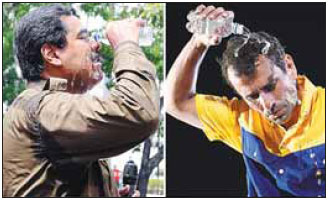Candidates in post-Chavez era
Acting President Nicolas Maduro and opposition leader Henrique Capriles will vie for the Venezuelan presidency in Sunday's elections.
Following is information about the two candidates and their policies:
Nicolas Maduro
A trade union leader who used to be a bus driver, Maduro took over as the country's interim president following the death of President Hugo Chavez in March.
As Chavez's hand-picked successor, Maduro is well ahead among the contenders for the presidency of the oil-rich South American country.
The partnership between Chavez and Maduro began when Maduro and his wife General Attorney Cilia Flores led a legal team to win Chavez's freedom from his involvement in a failed coup against then-president Carlos Andres Perez in 1992.
Maduro was elected to the National Assembly in 2000 and re-elected in 2005, when he became leader of parliament.
From 2006 to 2012, he served as the country's foreign minister and was named vice-president by Chavez in October.
In December, Maduro was declared Chavez's successor in case the president could not carry out his duties as a result of cancer. Maduro led the Venezuelan government while Chavez was in Cuba for treatment.
One of Maduro's campaign slogans is: "Chavez sets the route, Maduro takes the wheel," indicating that a vote for Maduro is a vote for continuing Chavez's reformist legacy.
Maduro has promised to continue Chavez's "missions" that have led to vastly improved health, literacy and general living standards among the majority of the poor and working classes.
He also pledges to tackle Venezuela's high inflation rate, insufficient food production and high crime rate.
Henrique Capriles
Capriles, presidential candidate of the opposition Coalition for Democratic Unity, served as governor of populous Miranda state from 2008 to 2012, when he stepped down to run against Chavez in the October elections.
Before that, Capriles, born in 1972, was the last and youngest vice-president of the dissolved Congress and president of the Chamber of Deputies between 1999 and 2000. He also served as mayor of Baruta for two consecutive terms from 2000 to 2008.
He was a founding member and leader of the right-leaning Justice First Party and served as its deputy national coordinator until 2008.
During his campaign in October, Capriles promised a major shift in the country's foreign policy if elected, including canceling arms purchases from Russia and distancing Venezuela from Iran and Belarus.
Capriles pledges to help the poor, while granting opportunities and greater participation to the private sector and the middle and upper classes.
Capriles also promises to bring inflation down to single digits, boost oil production to 6 million barrels a day and reconcile the government with the private sector, as well as boost agricultural production.
He plans to fight crime by creating more than 100,000 jobs a year and provide more opportunities for youngsters and those older than 45.
In the October elections, he lost with 44.31 percent of the vote compared with the 55.07 percent Chavez received.
|
Venezuelan acting President Nicolas Maduro (left) in Caracas on April 9 and opposition candidate Henrique Capriles in Barquisimeto, Venezuela, on April 11. Leo Ramirez / Juan Barreto via Agence France-Presse |
(China Daily 04/15/2013 page12)















